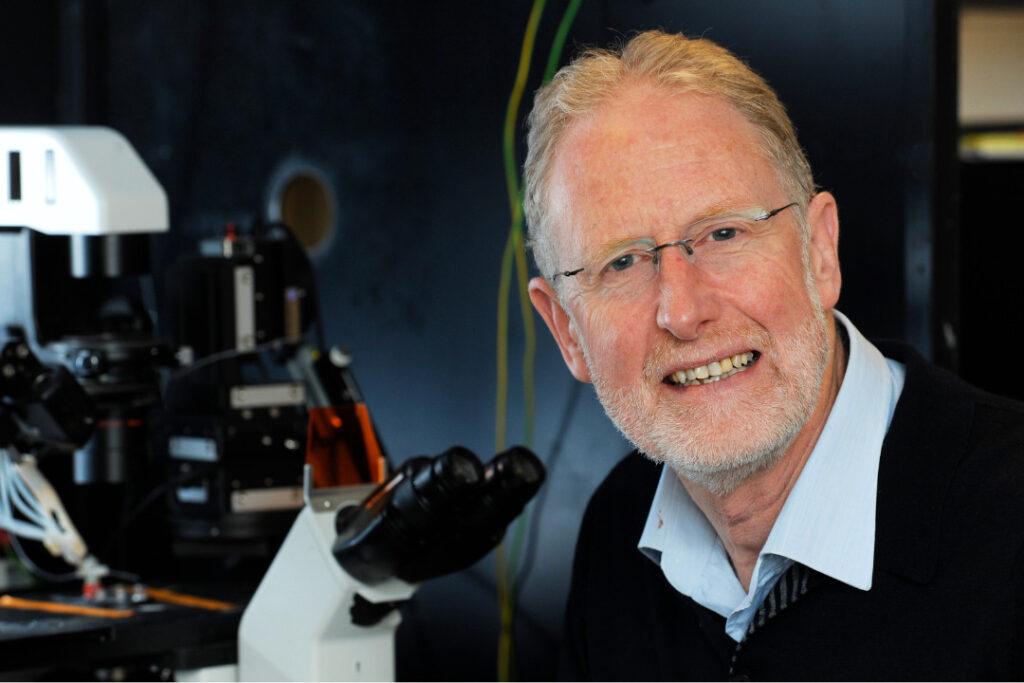Tinnitus is a sound heard in the ears or head which has no external source. Around 1 in 7 adults in the UK live with persistent tinnitus. It can have a severe impact on someone’s quality of life, causing anger, frustration, problems sleeping, depression and anxiety.
There is currently no cure for tinnitus or treatment that can reduce its perception over a long period of time. We want to develop better treatments for tinnitus that can silence it permanently.
Max, who has tinnitus:
I woke up one day and had a constant, high-pitched noise in my head … I started to feel some dizziness, even when I was sitting or lying down; feeling a bit seasick, a bit ‘off’. Even though [researchers] can’t predict if something they’re developing will work as a treatment or not, at least we know we’re not alone and there is work going into it.”

Our impact
What we’ve done
We’ve helped increase understanding of what happens when someone develops tinnitus. We still don’t fully understand the mechanisms and processes in the inner ear and brain that underlie tinnitus.
Through our funding, researchers have discovered that noise damage to the inner ear causes changes in the activity of parts of the brain that are involved in hearing, causing them to become hyperactive. A particular area of the brain that is involved in tinnitus is the inferior colliculus, which is involved in processing sound information from the inner ear.
Our research showed that it acts like a volume control, increasing its activity when the sound signal is weak to boost it and reducing its response when the signal is strong. If cells of the inner ear are damaged by loud noise and send less information to the brain than usual, the brain ‘turns up’ the volume in response, becoming hyperactive. In people with tinnitus, the ‘volume’ has been turned up, and hence their sensitivity to sound is increased.
This could explain why people with tinnitus hear sound that isn’t there – it’s like the static you hear on a speaker when the volume is turned right up, but there’s no music playing.
Further research we funded at the University of Western Australia led by Dr Helmy Mulders showed that tinnitus seems to have two stages of development – an early stage where blocking damage related signals from the inner ear can prevent tinnitus from becoming established and a later stage, when it has become permanently established in the brain. These findings are now being built on by other research groups to further our understanding of tinnitus and develop treatments.
Professor Peter McNaughton, tinnitus researcher at King’s College London:
Thanks to RNID funding, we have been able to investigate the idea that tinnitus may have its origin in excess activity in the nerves of the inner ear. There is still a long way to go before treatments could reach human patients, but this is a very promising start.”

What we’re doing now
We’re currently funding two studies testing different approaches to using non-invasive brain stimulation to silence tinnitus. We’re funding researchers at Flinders University in Australia led by Professor Raj Shekhawat to test whether a type of brain stimulation called High-Definition transcranial direct current stimulation (or HD-tDCS) can suppress tinnitus over a long period of time, and not just while the stimulation is occurring. Their results will help to establish whether this method could be used in the clinic to effectively treat tinnitus.
We’re also funding researchers at Trinity College Dublin in Ireland, led by Professor Sven Vanneste, to test their treatment. It aims to re-train the brain of someone with tinnitus so they don’t ‘hear’ it anymore.
This involves listening training, where the person is asked to pay attention to sounds that aren’t their tinnitus (which distracts them from it). The researchers combine this with a type of electrical brain stimulation that is thought to promote learning and memory creation. By combining these two methods, the brain stimulation will hopefully reinforce the learning from the listening training, creating long lasting suppression of tinnitus.
What we’ll work towards in the next 25 years
Our future work will focus on developing:
- better treatments that can silence tinnitus permanently
- better ways to protect people’s hearing from the damage that leads to tinnitus.
